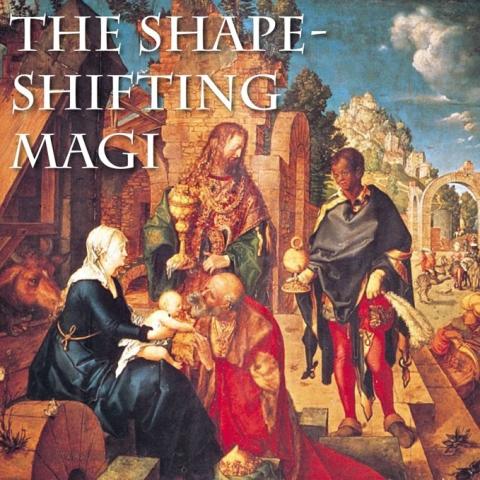The Rev. Stephen Milton talks about how the representation of the visit of the magi has changed over time… and how it might look in the future.

One of the interesting things about mythic stories is that the best ones have very few details. Less is more. Take the Magi who bring gifts to Jesus. We know them as the “three wise men” or “the three kings”, but the gospel account in Matthew doesn’t say either of those things. It simply mentions Magi who bring frankincense, gold, and myrrh. But as the story got told and retold, people wanted to fill in the blanks. How many Magi? Three, since there were three gifts. Wise men? Wise because they sought out Jesus by reading the stars. Men? An assumption. Some medieval paintings show a wise woman. In time, they even gained racial characteristics, and ages too. This picture shows men of three different stages of life, young, middle-aged, and old. Three races, too, representing the three known continents at the time: Asia, Africa, and Europe. They were given names: Melchior, Balthasar, Caspar. Over time, these unnamed, vague astrologers came to represent all of (male) humanity. Totally dropped the ball on gender. That’s patriarchy for you.
This “magi-cal” visit is a reminder that Christianity offered its insights to all the peoples and nations of the world. A lovely idea, but one that also justified a lot of coercive, colonial Christianity over the centuries. Indeed, starting early on, there was a belief that when the Magi met Jesus, any magical powers they possessed simply stopped. Their visit was not just to honour the newborn king, but a capitulation on behalf of pagan cultures. Paganism and its magic had been defeated. (John Milton’s poem “On the morning of Christ’s Nativity” plays on this idea.) So, as the Magi became better defined in the West, they also became tools in an imperial view of Christianity, justifying the conquest of other cultures.
Perhaps at this time, we could benefit from telling new stories about Christians who come with gifts to other faiths and cultures. Not to conquer or convert, but to show respect and listen. Those would be wise visitors, and this time, perhaps not all of them would be remembered as men.
—Rev. Stephen Milton came to Lawrence Park Community Church in Toronto in 2019, after decades of work as a documentary filmmaker. His passion is creating new ways to explore spirituality, appealing to people who aren’t interested in regular Sunday morning church services.
The views contained within these blogs are personal and do not necessarily reflect those of The United Church of Canada.